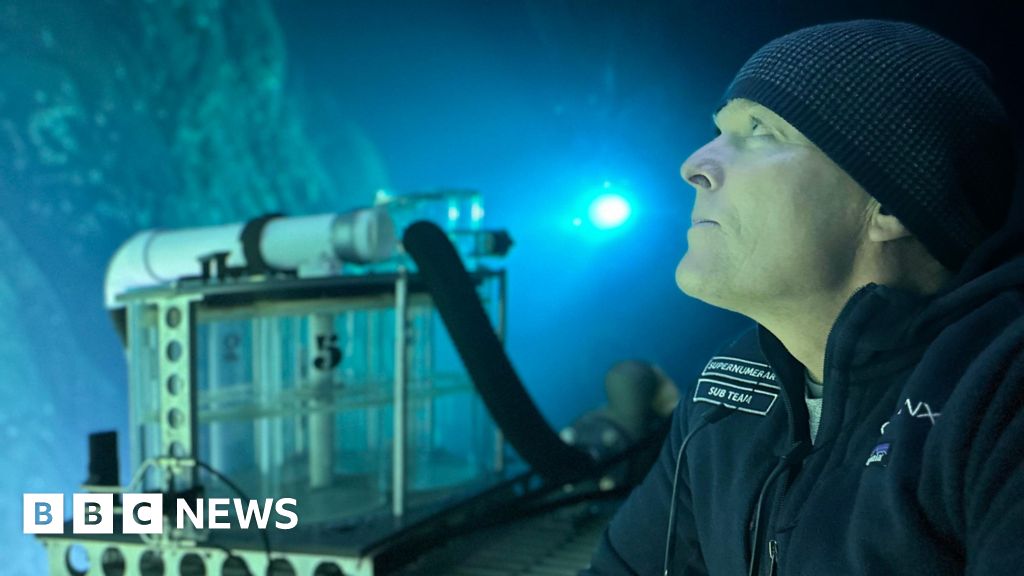Science
Whistleblower David Lochridge Reveals Oceangate’s Titan Failures

When the Titan submersible vanished during a dive to the Titanic wreck in June 2023, David Lochridge, a former employee of Oceangate, expressed deep concern for the five individuals on board, including Oceangate CEO Stockton Rush. Lochridge had previously warned the company about critical safety issues as early as 2018. Unfortunately, his fears were realized when the submersible imploded, resulting in the tragic loss of all lives aboard.
A recent report from the US Coast Guard (USCG) outlined significant failures in safety, testing, and maintenance practices at Oceangate as primary causes of the incident. “There is so much that could have been done differently. From the initial design to the build to the operations—people were sold a lie,” Lochridge stated in an interview with BBC News. He believes that US authorities could have intervened to prevent the tragedy.
Lochridge joined Oceangate seven years prior as the Director of Marine Operations, moving from Scotland to the United States to pursue his passion for deep-sea exploration. He was excited about the company’s plans to build a new submersible that would take paying passengers to the Titanic site. With over 25 years of maritime experience, including service in the Royal Navy and as a submersible pilot, Lochridge was tasked with ensuring the safety of the craft and its passengers.
The Titan was developed in collaboration with the University of Washington Applied Physics Laboratory, with plans to construct its hull from carbon fibre—a material not typically used in deep-sea submersibles. Initially, Lochridge felt confident in the project but grew concerned when Oceangate decided to bring the design and construction in-house, abandoning third-party oversight.
By the summer of 2016, Lochridge began to see alarming signs. As parts for Titan arrived, he identified several significant issues, including defects in the carbon fibre hull and improperly machined titanium domes. Most concerning was the revelation that the Titan would not receive independent safety certification, a crucial step for any vessel intended for such depths.
“I felt I had a duty of care to keep asking questions,” Lochridge remarked, detailing how he repeatedly raised his concerns with management, only to face resistance. In January 2018, he submitted a detailed report outlining his findings to the company’s directors. Following a tense two-hour meeting with Rush, he was dismissed from his position.
Subsequently, Lochridge reached out to the Occupational Safety and Health Administration (OSHA), who classified his case as urgent due to public safety concerns. OSHA referred his allegations to the US Coast Guard in February 2018. However, the situation escalated when Oceangate pressured Lochridge to withdraw his complaint, even demanding $10,000 for legal costs. When he refused, the company filed a lawsuit against him and his wife, alleging breaches of contract and other claims.
Lochridge countersued, alleging unfair dismissal. He maintains that OSHA’s response was inadequate, stating, “I provided all the documentation to OSHA; I was on the phone to OSHA every few weeks. OSHA did nothing.” In December 2018, under continued legal pressure, Lochridge and his wife decided to drop their case, which led to the suspension of OSHA’s investigation.
Despite these setbacks, Oceangate continued with its plans for Titan. The prototype underwent its first test dives in 2018 and 2019, achieving significant depths. However, cracks were later discovered in the carbon fibre hull, prompting further modifications. By 2021, Oceangate began offering dives to the Titanic, successfully completing 13 excursions over the next two summers.
The disappearance of Titan in June 2023 marked a tragic culmination of Lochridge’s concerns. Following the discovery of wreckage on the ocean floor, USCG public hearings revealed criticisms of OSHA’s slow handling of Lochridge’s initial complaints. Lochridge asserted, “I believe that if OSHA had attempted to investigate the seriousness of the concerns I raised on multiple occasions, this tragedy may have been prevented.”
In response to Lochridge’s claims, an OSHA spokesperson noted that their whistleblower protection program is limited to safeguarding against employer retaliation. They affirmed that the US Coast Guard had jurisdiction over the safety design and construction allegations. The Coast Guard’s report substantiated Lochridge’s concerns and highlighted missed opportunities for government intervention.
Jason Neubauer, chair of the USCG’s Marine Board of Investigation, acknowledged that the system failed Lochridge as a whistleblower. He stated, “The system did not work for the whistleblower in this case, and that’s why we just need to get better—and we have.” In light of the incident, Oceangate has ceased operations and is cooperating with ongoing inquiries into the disaster.
-

 Entertainment2 months ago
Entertainment2 months agoIconic 90s TV Show House Hits Market for £1.1 Million
-

 Lifestyle4 months ago
Lifestyle4 months agoMilk Bank Urges Mothers to Donate for Premature Babies’ Health
-

 Sports3 months ago
Sports3 months agoAlessia Russo Signs Long-Term Deal with Arsenal Ahead of WSL Season
-

 Lifestyle4 months ago
Lifestyle4 months agoShoppers Flock to Discounted Neck Pillow on Amazon for Travel Comfort
-

 Politics4 months ago
Politics4 months agoMuseums Body Critiques EHRC Proposals on Gender Facilities
-

 Business4 months ago
Business4 months agoTrump Visits Europe: Business, Politics, or Leisure?
-

 Lifestyle4 months ago
Lifestyle4 months agoJapanese Teen Sorato Shimizu Breaks U18 100m Record in 10 Seconds
-

 Politics4 months ago
Politics4 months agoCouple Shares Inspiring Love Story Defying Height Stereotypes
-

 World4 months ago
World4 months agoAnglian Water Raises Concerns Over Proposed AI Data Centre
-

 Sports4 months ago
Sports4 months agoBournemouth Dominates Everton with 3-0 Victory in Premier League Summer Series
-

 World4 months ago
World4 months agoWreckage of Missing Russian Passenger Plane Discovered in Flames
-

 Lifestyle4 months ago
Lifestyle4 months agoShoppers Rave About Roman’s £42 Midi Dress, Calling It ‘Elegant’









